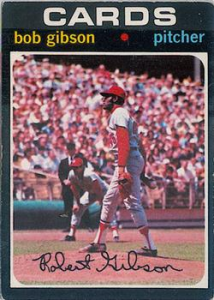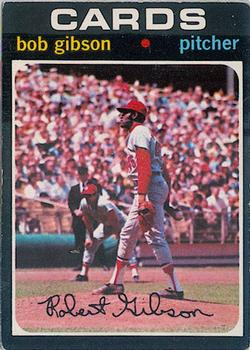May 1, 1971: Bob Gibson, Steve Renko stranded with no-decisions in only tie of season
 “He didn’t like to lose to anyone in anything,” catcher Tim McCarver wrote about pitcher Bob Gibson, his 1960s batterymate with the St. Louis Cardinals.1 One imagines that Gibson didn’t much like to tie anyone, either. But on May 1, 1971, the future Hall of Famer found himself on neither the long end nor the short end of a game against the Montreal Expos, working all seven innings of a rain-shortened 2-2 tie. It was the major leagues’ only deadlocked game that season.
“He didn’t like to lose to anyone in anything,” catcher Tim McCarver wrote about pitcher Bob Gibson, his 1960s batterymate with the St. Louis Cardinals.1 One imagines that Gibson didn’t much like to tie anyone, either. But on May 1, 1971, the future Hall of Famer found himself on neither the long end nor the short end of a game against the Montreal Expos, working all seven innings of a rain-shortened 2-2 tie. It was the major leagues’ only deadlocked game that season.
Montreal starting pitcher Steve Renko, while not as famously fierce as Gibson, might have had reason to be angry after the game as well. If not for a mistake by the usually slick-fielding shortstop Bobby Wine, Renko might have come away from the abbreviated contest with a complete-game victory.
The Cardinals and Expos ended April 1971 very much in the running in the developing National League East Division race. Gene Mauch’s Expos boasted a 9-6 record, good for second place, one game behind the New York Mets. It was not uncommon for the Expos to lose games to weather in the early going, and five of the team’s games had been either rained or snowed out over the course of April. With a record of 13-11, Red Schoendienst’s Cardinals were tied for third place, 1½ games back.
The St. Louis lineup combined veteran faces with more recent arrivals. Left fielder Lou Brock, second baseman Julian Javier, shortstop Dal Maxvill, and Gibson were all holdovers from the Cardinals’ World Series teams of 1967 and 1968. In his third campaign with St. Louis, third baseman Joe Torre had just begun a monster season that saw him hit .363 with 24 home runs and 137 RBIs, earning him the NL Most Valuable Player and The Sporting News Player of the Year Awards. Highly touted catching prospect Ted Simmons was playing his first full season as a starter and also delivering the goods, finishing the year with a .304 average, 7 home runs, and 77 RBIs. Brock, Torre, and Simmons, like Gibson, went on to reach the Hall of Fame.2
Gibson, meanwhile, was making his sixth start of the season and his first against Montreal. He entered the game with a 3-2 record and a 3.38 ERA. He’d thrown complete games in each of his first four starts but had been roughed up by New York in his previous start, getting chased in the fourth inning of a 12-2 loss.3
The Expos’ lineup boasted a few sources of veteran punch. They were third baseman Bob Bailey, who’d posted a career-high 28 homers the prior season; right fielder Rusty Staub, who played all 162 games in 1971, hit .311, and made the All-Star team; and first baseman Ron Fairly. Renko was making his fifth start of the season and his first against St. Louis. He entered the game with a 3-0 record and a 2.03 ERA. (The Expos and Cardinals had met only once before in 1971. The previous night, a two-run seventh-inning rally gave St. Louis a 4-2 victory.)
A Cap Day crowd of 32,061 didn’t see Gibson at his dominant best. The pitcher, in his 13th season, allowed at least one Expo to reach base in every inning but the seventh. Montreal struck quickly for a run in the top half of the first. Bailey, hitting just .160 coming into the game, led off with a double to left field and moved to third on a wild pitch by Gibson.4 Second baseman Ron Hunt struck out, but Staub laced a “blistering” double down the right-field line to drive in Bailey. With two out and two on, center fielder Boots Day hit a hard grounder to the mound that Gibson snagged to end the rally. “He saved his own game right there,” Mauch said afterward.5
Both teams wasted chances from there. Brock led off the bottom of the first with a single to right field, but Montreal catcher John Bateman gunned him down trying to steal second base, and St. Louis mustered nothing further.6 In the second, the Expos got Bateman to third on a double and a sacrifice, but Gibson retired Renko and Bailey to end the inning.
Then came Wine’s costly gaffe in the bottom of the second. Torre led off with a single. Right fielder José Cardenal flied out. St. Louis first baseman Joe Hague followed with a hard grounder to his opposite number, Fairly—a potential inning-ending double-play ball. Fairly scooped up the ball, touched first, then threw to the shortstop covering second.
When Fairly touched first, it removed the force at second, requiring Wine to tag Torre for the third out. But Wine hadn’t seen Fairly touch first, and he read the play as a 3-6-3 double play instead. Rather than tag Torre, Wine took Fairly’s throw, stepped on second, and threw back to first. Torre reached second safely. Renko, who should have been back in the dugout, surrendered a walk to seventh-place hitter Javier and a triple to eighth-place hitter Maxvill to hand the Cardinals a 2-1 lead. Maxvill entered the game with a batting average of .118, a solitary extra-base hit, and a single RBI.7
Renko didn’t allow the Cardinals another baserunner for the rest of the game, but the damage had been done. “I should have yelled [to tell Wine to tag Torre]. Everyone should have yelled. … There was that awful silence,” Renko said after the game. “It was just one of those things. Everybody should have been yelling,” Mauch added.8
Wine compounded his disappointing play in the fourth, when he grounded into an inning-ending double play after Bateman walked. Hard rain before the bottom of the fifth inning forced a 35-minute delay.9
The Expos couldn’t put another serious rally together until the sixth, when Fairly led off with a double and took third on a passed ball by Simmons.10 Gibson retired left fielder Jim Fairey and Day. But Bateman, identified by the St. Louis Post-Dispatch as “often a pest to the Cardinals,”11 dinged him for a game-tying bloop single to score Fairly. Wine ended the inning with a fly ball to left field.
Neither team mustered another baserunner before the heavy rain returned at about 8:50 P.M., with Simmons at bat in the bottom of the sixth.12 The umpiring crew of Mel Steiner (home plate), Bob Engel (first base), Tony Venzon (second base), and Stan Landes (third base) again stopped play at 9 P.M. After 82 minutes of additional waiting, they called the game.13 Venzon, incidentally, was in the final month of a 15-season career as an NL ump. He worked his last game on May 25 before health problems forced his retirement, and died that September following open-heart surgery.14
The May 1 game represented the third and final time Gibson took the mound in a tie. In the second game of a doubleheader on September 5, 1960, the second-year pitcher made a brief relief appearance in a game against the Cubs at Wrigley Field that ended in a 10-inning, 4-4 tie. He faced two batters in the sixth inning, walked both, and was replaced. And on Opening Day, April 12, 1965, again at Wrigley Field, Gibson started a game that ended as a 10-10, 11-inning deadlock against the Cubs. He was pulled from the game with one out in the fourth inning.
In the end, the May 1 tie didn’t have an impact on the NL East race. St. Louis finished a strong but distant second place, seven games behind Pittsburgh, with a 90-72 record. Montreal closed in fifth place with a 71-90 record, slightly worse than 1970’s 73-89 slate.
Acknowledgments
This article was fact-checked by Gary Belleville and copy-edited by Len Levin.
Sources and photo credit
In addition to the specific sources cited in the Notes, the author used the Baseball-Reference.com and Retrosheet.org websites for general player, team, and season data and the box scores for this game:
https://www.baseball-reference.com/boxes/SLN/SLN197105010.shtml
https://www.retrosheet.org/boxesetc/1971/B05010SLN1971.htm
Image of 1971 O-Pee-Chee card number 450 downloaded from the Trading Card Database.
Notes
1 Tim McCarver with Ray Robinson, Oh, Baby I Love It! (New York: Dell Publishing, 1987), 58-59.
2 Cardinals ace Steve Carlton also reached the Hall of Fame, but didn’t play on May 1.
3 Much later in the season, on August 14, Gibson pitched a no-hitter in an 11-0 stomping of the Pittsburgh Pirates.
4 Gibson’s 10 wild pitches in 1971 ranked him seventh in the NL. He placed in the league’s top 10 for wild pitches five times between 1961 and 1972.
5 Ian McDonald, “Botched-Up Doubleplay Leads to Saturday Washout,” Montreal Gazette, May 3, 1971: 19.
6 Brock went on to lead the NL in both stolen bases (64) and caught stealing (19) in 1971.
7 Maxvill doubled off Philadelphia’s Ken Reynolds on April 22, scoring Torre, in a 5-2 St. Louis win.
8 McDonald. In the story, Bailey said he called out to Wine to tag Torre, but “I guess I didn’t yell loud enough.”
9 Neal Russo, “Cardinals, Expos Battle at Busch,” St. Louis Post-Dispatch, May 2, 1971: 1E.
10 Simmons’ 18 passed balls in 1971 ranked him second in the NL behind San Francisco’s Dick Dietz, who had 20. He went on to lead the league in passed balls three times, in 1973, 1975, and 1979.
11 Russo. Over his 10-year major-league career, the Oklahoma-born catcher hit .259 with 10 homers and 44 RBIs in 102 games against St. Louis. For comparison’s sake, he hit .230 over his entire career.
12 Russo.
13 Russo and McDonald.
14 Associated Press, “Rites Friday for Tony Venzon,” Lock Haven (Pennsylvania) Express, September 21, 1971: 8.
Additional Stats
Montreal Expos 2
St. Louis Cardinals 2
7 innings
Busch Stadium
St. Louis, MO
Box Score + PBP:
Corrections? Additions?
If you can help us improve this game story, contact us.


